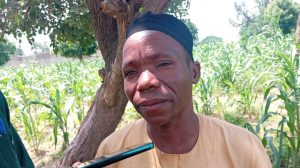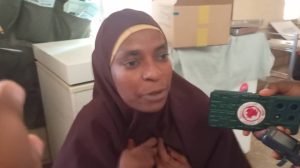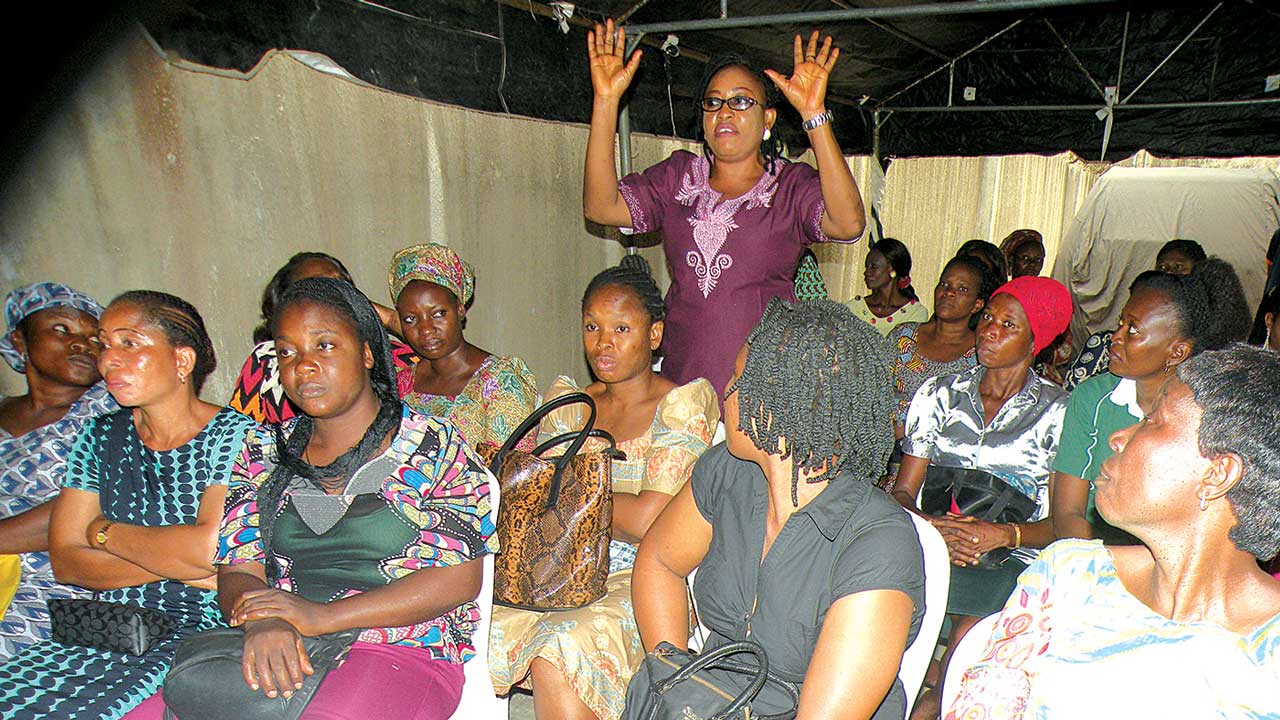Hauwa’u Zuraiyah is a middle-aged woman who got married about 17 years ago. According to her, throughout her marriage, she had never used any form of family planning—not out of negligence, but because she was made to believe that contraception, from a cultural misconception, was linked to infertility.
She was seen with a one-year-old boy clinging to her at Dankaza Urmi, Wudil Local Government Area of Kano.
“My husband never believed in using any form of family planning. We have spent 17 years together and we have four kids. I can tell you that I have serious issues recovering between pregnancies. Each new pregnancy brought financial stress, physical exhaustion and emotional strain, especially as my body aged and our responsibilities grew heavier. This last pregnancy was unplanned and difficult, leaving me overwhelmed and uncertain about my future.”
According to her, one of the community health volunteers patiently explained the benefits and safety of family planning. For the first time, she learnt that contraception could help her space her children, protect her health and regain control over her body and choices. The encounter opened her eyes to a reality she had never fully understood—that family planning was not about denying motherhood, but about preserving her well-being and planning her family’s future wisely.
In 2022, data showed that 1,000 new babies were being born daily in Kano State. This pushes the 50 million population projection close to reality by 2050. A survey by PMA Data, in collaboration with the Bill and Melinda Gates Institute for Population and Reproductive Health in 2024, discovered that 29 per cent of pregnancies were unintended.
Over the years, myths and misconceptions about family planning and contraception have run deep in communities—particularly in the northern part of Nigeria. Many have laced modern child spacing with taboo, while others cite religious beliefs, even though child morbidity keeps rising.
How communities are responding
Community-based efforts, especially in Kano State, have advanced access to child spacing campaigns, particularly among men, women’s volunteer groups, and traditional and religious leaders. These informal groups have been working assiduously to dispel myths about family planning commodities and promote sexual and reproductive health.
In communities like Rano and Wudil, men formed the Men Majalisa Forum—a gathering where men sit and discuss societal issues after retiring from the day’s work and hustling. Majalisa is common among men in the North and has influenced political choices and electoral strength. A man, as head of a family, has a certain influence on the voting pattern of his dependants.
As such, the platform has been integrated into sexual and reproductive health campaigns and has been driving the uptake of family planning commodities. The gathering has also helped dispel rumours and myths against childbirth spacing contraceptives.

In Nigeria, especially in the North, men are determining factors in the decision-making process over their wives. It has been observed that men’s disapproval of child spacing with contraception has been one of the major reasons for unplanned pregnancies and childbirth complications. To control the trend, MSI Nigeria has leveraged the Majalisa to win men’s hearts.
The leader of the Majalisa Forum in Rano, Malam Ahmad Abubakar, told this reporter that more men who resisted childbirth spacing had been the target of the forum. “We try to invite, convince and follow up on them until they embrace the practice. But thank God, we have been able to win many of them.”
Fatima Muhammad, a resident of Wudil in Kano State, narrated how she was introduced to implant contraceptives by one of the community health care providers last year. She explained that the family planning method has no implication for her health and has allowed her to focus on her career and family activities.
“I have been trying my best to explain to other women that this is a safe method to avoid unplanned pregnancies,” she said.
Last year, MSI Nigeria Reproductive Choices trained community health workers who are popularly called MS Ladies. They are trained midwives or community health extension workers making reproductive commodities accessible to families in rural and urban centres of Kano State. These volunteers provide family planning and post-abortion care in the communities. They offer services within their catchment areas on reproductive health in all the 44 local government areas of the state.
Habiba Isa, one of the trained midwives in Rano, said that she recorded between 100 and 150 clients monthly in her catchment area of Rano. According to her, contraception such as implants, injectables, IUDs and oral pills have been embraced by women of reproductive age.
“For us, the MS Ladies, we have been empowered to do this work and we are getting results from it. We take these commodities to hard-to-reach communities and you see women turning up after our enlightenment. They now see reasons to plan their pregnancies. They discuss child spacing among themselves. Another driving force is that the contraceptive commodities are given free.”
One of the male beneficiaries of family planning, Yusuf Ali, told this reporter that he had been able to control his family size with the use of condoms, which, he said, allowed him to space his children for 30 months. “It was introduced to me by a friend and I now enjoy it any time I want to get pregnant,” he said.
Traditional and Religious Leaders as Trusted Voices
Apart from the efforts of the Majalisa Forum and MS Ladies, traditional leaders are shifting the narrative about child spacing campaigns. These opinion leaders have used their voices to dispel negative myths.
Alhaji Muhammad Umar, the Emir of Rano in Kano State, believes that the efforts of traditional and religious leaders have made men embrace various methods of childbirth spacing, which has reduced the number of children a household can effectively manage.
“Our people are accessing different methods that best suit them. On Fridays, our Islamic clerics take the advantage to educate the people on the importance of childbirth spacing. They have seen the importance of the process, as children who have spaces between them are looking healthier and living better than those who do not have spaces between them.”
Thousands of unplanned pregnancies averted

Between January and June 2025 in Kano State, MSI Nigeria data on its interventions showed that 145,594 unintended pregnancies were averted. It reported that no fewer than 747 maternal deaths were prevented, while a total of 320,285 Disability Adjusted Life Years (DALYs) were averted. It also reported that a total of ₦16.1 billion was saved as a direct healthcare cost.
A Social Norms Advisor at MSI Nigeria Reproductive Choices, Abdullahi Saminaka, explained that the organisation had leveraged the Majalisa Forum and MS Ladies, and most importantly, traditional and religious leaders, to advance the uptake of childbirth spacing in resistant and hard-to-reach communities.
According to him, “We understand the complexity of where we operate in terms of religious beliefs and traditional settings. In that case, we deployed methods where the opinion leaders take the lead and convince the people to see reason. Today, we have recorded these tremendous achievements.”
Caution: Kano doesn’t cater for unmarried adolescents
Kano State Government policy on childbirth spacing doesn’t target unmarried sexually active adolescents. The state, no matter the age, focuses on married adolescents and adults for family planning commodities. The state assumes that the majority of the beneficiaries are supposed to be married and lacks mechanisms to sort married and unmarried adolescents.
The state policy, according to a director at the State Primary Health Care Development Board, Hajiya Zara’u Ibrahim, confirmed that the policy states that family planning’s target is married adolescents. She said that several considerations formed the basis for the policy, such as religion and culture.
“Here, what we normally do is encourage unmarried adolescents to abstain from sex. You might think that it is not working, but we have what we call family health education in our schools, which is part of the curriculum. We still emphasise abstinence from sex during our outreach, but of course, it is not everything that you say that they do,” she said.
Kano, although it has achieved tremendous improvement in childbirth spacing campaigns and uptake, has no clear-cut plan for unmarried adolescents in terms of sexual and reproductive health. It seems to be treading softly on the fragility of the cultural and religious settings of the region.
Meanwhile, using the Kano model in childbirth spacing might not be generally applicable in other climes. However, the state government has over 400 youth-friendly facilities across the 44 local government areas, while its budget line for family planning has enjoyed excellent releases.
This story was supported by Nigeria Health Watch, in partnership with MSI Nigeria Reproductive Choices and the Family Planning News Network (FPNN), through the Solutions Journalism Network.






